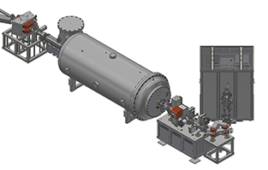U.S. Department of Agriculture Secretary Tom Vilsack
announced that Washington State University
and University of
Washington each will
receive a five-year, $40 million grant to help develop alternatives to
petroleum-based fuels and chemicals. As a partner in the Washington State
University-led Northwest Advanced Renewables Alliance (NARA), the U.S. Forest
Service Forest Products Laboratory (FPL) will receive $1.1 million to pretreat
woody biomass for conversion to aviation fuel.
“This is an opportunity to create thousands of new jobs and
drive economic development in rural communities across America by
building the framework for a competitively priced, American-made biofuels
industry,” Vilsack says. “Public-private partnerships like these will drive our
nation to develop a national biofuels economy that continues to help us grow
and out-compete the rest of the world while moving our nation toward a
clean-energy economy.”
NARA
includes a broad consortium of scientists from universities, government
laboratories, and private industry. The WSU-led grant aims to address the
urgent national need for a domestic biofuel alternative for U.S. commercial
and military air fleets. NARA
researchers envision developing a new, viable, aviation fuel industry using
wood and wood waste. The project also will focus on increasing the
profitability of wood-based fuels through development of high-value, bio-based
co-products to replace petrochemicals that are used in products such as
plastics.
FPL research engineer JunYong Zhu will demonstrate his
patent-pending technique, SPORL (Sulfite Pretreatment to Overcome Recalcitrance
of Lignocellulose) in the NARA
program. Zhu has successfully used SPORL on lodgepole pine woody biomass
(juvenile wood with a high lignin content), but his contribution to NARA will be using SPORL
on biomass of another softwood, Douglas-fir, grown by Weyerhaeuser.
SPORL was developed on the basis of sulfite pulping
technology, which has been carried out at a large commercial scale for decades.
By making use of existing equipment, processes, and knowledge of the pulp and
paper industry, SPORL presents fewer technical barriers to building new plants
or to retrofitting existing pulp mills to production of biofuels. The process
also reduces energy requirements and will address feedstock variability of
bark, needles, and branches through the study of sugar and lignin content at
Gevo (a renewable chemicals and advanced biofuels company) and Weyerhaeuser.
This pretreatment process is an integral part of converting woody biomass to
aviation fuel. The pretreated materials will be sent to Weyerhaeuser and Gevo
for conversion to renewable chemicals and advanced biofuels, respectively.
Forest Products
Laboratory, www.fpl.fs.fed.us




